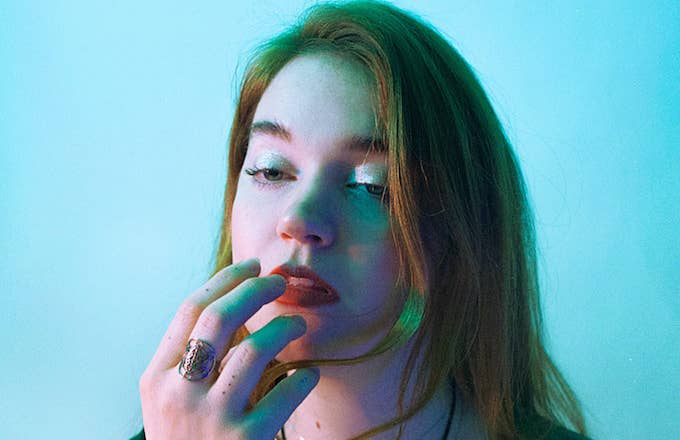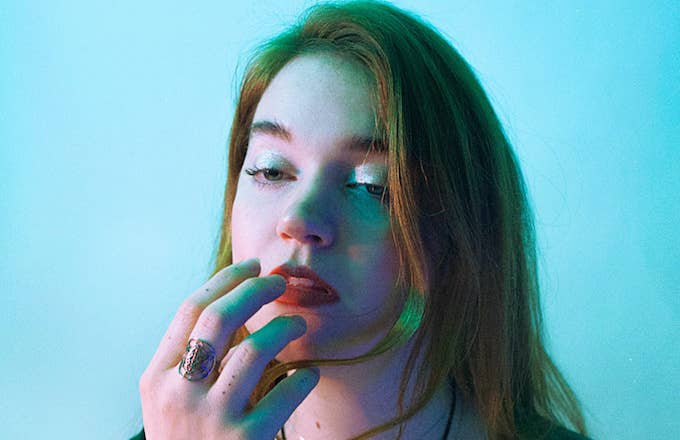
Anna Wise is a name that any devoted Kendrick Lamar fan recognizes. Wise's gorgeous singing voice has been a staple of Kendrick's music since 2012's Good Kid, M.A.A.D. City, and the pair even won a Grammy for Best Rap/Sung Collaboration in 2016 for "These Walls."
On Damn, Wise appears in a new role—as a credited songwriter, for the track "Pride." Complex spoke with Anna while she was driving to the first date of her Act II tour (dates here) to talk about her history with Kendrick, writing with the Internet's Steve Lacy, and her fantastic solo new project, The Feminine: Act II.
First of all, I’ve noticed that every time I’ve seen you in the past year, you have not made me call you “Grammy award winner Anna Wise,” which I think is a mistake. Why not?
[Laughs]. Because, it’s just a thing.
Has winning a Grammy changed anything?
So much. It’s changed everything. The way people view me, what kind of opportunities I have. I got super-involved with the Grammys, actually, and I went with them to D.C. to lobby for the National Endowment for the Arts, which was amazing.
Something cool about the Grammys, beyond the awards show is, they have a whole lobbying system set up in Congress to help protect artists and move forward these bills that will benefit artists and producers and engineers. I love the organization.
My one friend, she had a $3,000 hospital bill, and MusiCares [an organization run by the Recording Academy that, among other things, provides emergency financial assistance to music professionals] paid for her whole bill. So I'm a huge fan of the Grammys outside of the Grammys. It changed my life.
I saw something you tweeted after Damn came out, about how on Kendrick's projects you've gone from singing parts other people wrote to writing your own material. Would you tell me how your role has changed with TDE projects over the years?
When Kendrick put me in initially, I think he wanted me to teach him how to sing. But when we got together, it was like collaboration, full explosion. We were both like, "Woah!" and we just fell in love with each other, creatively. I completely immersed myself into giving, creatively, whatever he needed for whatever song. Whether that was singing in an opera voice, doing some good old popping, just different notes happening really fast or different runs. He wanted me to emulate a gospel choir on the intro of "For Free?" You hear that. [Sings "Aaah."] That's all me.
Just, you know, trying shit. For so long, it was just about us exploring his desires, creatively—of course with my flavor and my intention energetically flowing in and around and out, within it being totally focused on him.
With "These Walls," that was the first time that he was like, "We're gonna write together." So he brought me into this little side room in the studio, and we wrote the intro to "These Walls" together.
But for "Pride," it's really interesting because I didn't even write that for him. I wrote that in a session with Steve Lacy where just him and I were together. Kendrick and I, we've both been so busy. We haven't been able to meet up to work. I send him little, you know, voice memos. I'm always sending him little things just to be inspired by.
But when I worked with Steve on this track and I wrote that, [sings] "Me I wasn't taught to share but care." I wrote that whole thing—"In another life, I surely was there," all those harmonies, and then the refrain, "Maybe I wasn't there." That's all what I wrote with Steve.
So then for Kendrick to hear that outside of the context of us working together, and for him to want to use it, and for him to sing it—like, he's singing what I wrote. When has Kendrick ever sung or rapped something that someone else wrote? Let's find another example of that—I'm pretty sure there isn't one. Not only did the universe bring us back together so that we could collaborate again, even though it was remotely; the universe was just elevating my role to a larger place. Even though I'm on the album less, it's just as much of my soul because it's something that I wrote.
Did your voice end up making the final track?
I think that they mixed my voice and his on some of the notes, which they do for a lot of things. I can't say for sure that that's true. But I can hear myself, especially towards the end, singing, "Maybe I wasn't there," and then I sing this little refrain at the end where I go, "I saw you first." You can hear me at the end singing that.
I thought that was you!
Steve wrote the guitar part, and I wrote the lyrics and the melody and everything.
What was going through your head when you were writing the words and the melody, since you didn't realize it was going to be for Damn?
I met with Steve with the intention of making stuff that might be on The Feminine: Act II. But often when I write, I allow the stream of consciousness to come and I sing whatever comes out. I'm not like, "This song's going to be about this." So I sang something, and then we listened back to it. Actually, what I sang when we did the demo is exactly what it is. We didn't change anything.
How did you decide to work with Steve in the first place?
I met him at a Grammy party the year that I won for "These Walls." He ran up to me like, "You're Anna Wise! Oh my God! I would love to work with you!" So we just exchanged numbers. I was kind of familiar with [his band] The Internet and who they were, but not really very much.
We didn't meet up until a year after that, and then I hit him up because I was in L.A., and Kendrick wasn't there so I couldn't go into the studio with him, and I had an off day. I was just like, "Oh yeah, I should meet up with Steve."
Since you didn't record directly with Kendrick, I'm guessing there's no more stuff from the sessions for this album? Or did you work on other songs that he used that didn't make the record?
I mean, who knows? We could have an Untitled Unmastered situation, where they're going to bring out other, older songs. I'm on so many songs of his that I don't even remember them all. There's just so many that I've done in the past.
What were your thoughts when you heard the final version of "Pride"? Did you hear it before the album was released?
Oh no. I heard it when it came out. Again, I just have been so busy. When Kendrick reached out and he was so excited about the track and wanted to know what it was about and stuff, I didn't even think, "Oh, he might use it." I just was like, "Wow, he really likes the song. That's great."
When I heard it, I just felt really proud of him for how well he was singing, and I felt as if I had accomplished something in singing with him for so many years and teaching him different techniques and stuff. I felt really proud of him for sounding so beautiful and felt really proud of myself for writing something that was worthy of being on his record. That's a huge deal. I felt happy and I felt loved, like the universe found a way for Kendrick and I to collaborate, even though we both were busy this year.
Tell me about The Feminine: Act II. The Feminine: Act I dealt very directly with feminine archetypes. How does this one differ?
Good point. I feel like Act I is very visceral and literal, and Act II is more macro and emotional and about the concept of a feeling more than the literal issues that I felt I needed to tackle head-on in Act I. Act I was like, "This is what's fucked up," and Act II was more like, "But we can overcome this."
With Act II, I wanted to make something that could be empowering for women or anyone who is being discriminated against or feels marginalized, because a huge issue that the world's dealing with is inequality and marginalization of people who deserve to be loved. So I just wanted to give some love.
I know you're dealing with those issues in the new video for "Stacking That Paper." What can you tell me about that?
Yeah. "Stacking That Paper" is a video that I directed, shot, produced, and edited. So it is completely of my mind, and it stars a very, very special woman who I love a lot. That's really all I want to say about it, because I want it to speak for itself.
We're talking while you're on the road. What's going on with the tour?
Today's the first day. It's an extended North American tour. I'll be on tour for the next two months. I'm really excited to be able to play larger theaters.
You've performed in duo and band settings with your group Sonnymoon a lot. How is performing under your own name different?
It's different because it's just me onstage, and I have have complete control. Especially my past few shows, I've been improvising my whole set list. I know what song I want to start with and what song I want to end with, and then everything in between is a big question mark. That's been really fun because that's a lot harder to do that with more than one person onstage. So I have a lot of fun challenging myself to stretch things out.


